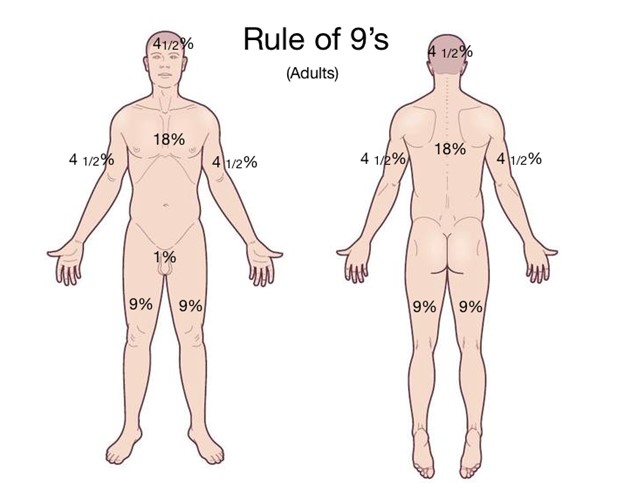When performing an assessment, the nurse observes for bilateral equality. After performing a neurological assessment, which of the following will the nurse document when assessment findings indicate that there is left facial droop?
Inability to perform within normal limits
Symmetrical findings
Asymmetrical findings
Bilateral strength present
The Correct Answer is C
Choice A Reason: This choice is incorrect. Inability to perform within normal limits is a vague and general term that does not describe the specific finding of left facial droop. The nurse should document the exact observation and compare it to the expected or normal range.
Choice B Reason: This choice is incorrect. Symmetrical findings mean that both sides of the body or face are equal or similar in appearance or function. Left facial droop indicates that one side of the face is lower or weaker than the other, which is not symmetrical.
Choice C Reason: This is the correct choice. Asymmetrical findings mean that both sides of the body or face are unequal or different in appearance or function. Left facial droop indicates that one side of the face is lower or weaker than the other, which is asymmetrical.
Choice D Reason: This choice is incorrect. Bilateral strength present means that both sides of the body or face have normal or adequate muscle power or force. Left facial droop indicates that one side of the face has reduced or impaired muscle power or force, which is not bilateral strength present.
Nursing Test Bank
Naxlex Comprehensive Predictor Exams
Related Questions
Correct Answer is A
Explanation
Choice A reason: This is correct because hearing loss is the most common complaint associated with a problem involving the inner ear. The inner ear consists of the cochlea, which is the organ of hearing, and the vestibular system, which is the organ of balance. The inner ear converts sound waves into nerve impulses that are sent to the brain. Any damage or dysfunction of the inner ear can impair hearing and cause hearing loss.
Choice B reason: This is incorrect because tinnitus is not the most common complaint associated with a problem involving the inner ear, but rather a symptom that can occur with various ear problems. Tinnitus is a ringing, buzzing, or hissing sound in the ears that is not caused by an external source. Tinnitus can be caused by exposure to loud noise, ear infections, earwax buildup, aging, or certain medications, but it is not specific to the inner ear.
Choice C reason: This is incorrect because pruritus is not a complaint associated with a problem involving the inner ear, but rather a complaint associated with a problem involving the outer ear. Pruritus is itching of the skin that can be caused by dryness, irritation, infection, or allergy. Pruritus can affect the outer ear, which is the visible part of the ear that collects and directs sound waves into the ear canal, but it has no relation to the inner ear.
Choice D reason: This is incorrect because muffled sounds are not a complaint associated with a problem involving the inner ear, but rather a complaint associated with a problem involving the middle ear. Muffled sounds are sounds that are unclear or distorted due to reduced sound transmission or perception. Muffled sounds can be caused by fluid buildup, inflammation, infection, or perforation of the eardrum in the middle ear, which is the air-filled space between the eardrum and the inner ear that contains three tiny bones that amplify sound vibrations.
Correct Answer is A
Explanation
Choice A Reason: This is the correct choice. Using the rule of nines, each arm accounts for 9 percent of TBSA, each leg accounts for 18 percent of TBSA, and front and back are equally divided. Therefore, burns on both sides of both arms and legs equal to (9 + 9) x 2 + (18 + 18) x 2 = 36 percent of TBSA.
Choice B Reason: This choice is incorrect. Using the rule of nines, burns on both sides of both arms and legs equal to 36 percent of TBSA, not 54 percent. To get 54 percent of TBSA, one would have to add burns on both sides of head and neck (9 percent), chest (9 percent), and abdomen (9 percent).
Choice C Reason: This choice is incorrect. Using the rule of nines, burns on both sides of both arms and legs equal to 36 percent of TBSA, not 27 percent. To get 27 percent of TBSA, one would have to subtract burns on both sides of one leg (18 percent).
Choice D Reason: This choice is incorrect. Using the rule of nines, burns on both sides of both arms and legs equal to 36 percent of TBSA, not 18 percent. To get 18 percent of TBSA, one would have to divide burns on both sides of both arms and legs by two.
Choice E Reason: This choice is incorrect. Using the rule of nines, burns on both sides of both arms and legs equal to 36 percent of TBSA, not 9 percent. To get 9 percent of TBSA, one would have to divide burns on both sides of both arms and legs by four.

Whether you are a student looking to ace your exams or a practicing nurse seeking to enhance your expertise , our nursing education contents will empower you with the confidence and competence to make a difference in the lives of patients and become a respected leader in the healthcare field.
Visit Naxlex, invest in your future and unlock endless possibilities with our unparalleled nursing education contents today
Report Wrong Answer on the Current Question
Do you disagree with the answer? If yes, what is your expected answer? Explain.
Kindly be descriptive with the issue you are facing.
